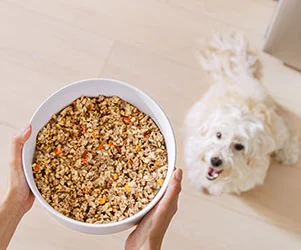As pet parents, it’s only natural to worry when our furry friend seems under the weather. Hearing them sneeze or sniffle one too many times, and the onset of flu season can cause us to wonder, “Can dogs get the common cold?”
While dogs don’t catch the same cold virus as humans, they can experience similar symptoms caused by different viruses, germs, and bacteria. Dog cold symptoms may look slightly different than those in humans, but there are ways to recognize signs of illness and things you can do to help your pup recover and support their immune system to help prevent them from getting sick in the first place.
Can Dogs Get the Common Cold?
Dogs don’t get the common cold caused by rhinoviruses in humans, so don’t worry if you’re feeling a little unwell yourself — you won’t pass your sniffles to your pup.
Dogs can, however, catch other respiratory infections caused by different pathogens that mimic cold-like symptoms, including:
- Canine adenovirus type 2
- Canine parainfluenza virus or “dog flu”
- Canine respiratory coronavirus
- Bordetella bronchiseptica (a bacterium associated with “kennel cough”)
Though it’s not technically the same common cold virus, dogs can still get colds, just of a different variety. These illnesses are often mild, but can sometimes progress to more serious conditions like canine influenza or pneumonia if left untreated.
How Dogs Get Sick And What to Watch For

Like humans, dogs can get sick from close contact with other dogs, exposure to crowded environments like kennels, daycares, or dog parks, or weakened immune systems. Some viruses and bacteria spread via aerosol droplets, direct contact, or contaminated surfaces like bowls or toys. Here are some of the common signs of cold-like illness in dogs.
Common Cold-Like Symptoms in Dogs:
- Sneezing
- Runny nose or nasal discharge
- Coughing (especially a hacking cough)
- Mild fever
- Watery eyes
- Decreased energy
- Loss of appetite
These symptoms can last anywhere from a few days to a week or longer. If your dog develops more serious signs of illness like trouble breathing, or doesn’t show signs of getting better, it may indicate something more severe than a simple cold. In such cases, contact your vet right away. More serious symptoms include:
- Difficulty breathing
- Thick yellow or green nasal discharge
- Lethargy that doesn’t improve
- A high fever
- Refusal to eat or drink for more than 24 hours
Some dog breeds may be more susceptible to colds and respiratory infections due to their physical characteristics or genetic predispositions. Brachycephalic breeds, such as Bulldogs, Pugs, Boxers, and Shih Tzus, are at a higher risk because of their short nasal passages and narrow airways. This can make it harder for them to clear respiratory infections and breathe comfortably when congested.
Toy breeds and small dogs like Chihuahuas and Yorkshire Terriers can also be more vulnerable. Puppies, senior dogs, and dogs with weakened immune systems, regardless of breed, are at higher risk of catching colds or respiratory illnesses. Regular vet check-ups and a strong immune system are especially important for these breeds.
What to Do If Your Dog Has Cold Symptoms
If your dog shows mild cold-like symptoms, but is otherwise eating, drinking, and alert, it’s most likely safe to provide care at home. Here are some things you can do to help your furry friend feel better.
1. Provide rest and comfort
Keep your dog indoors, away from cold drafts and active play. Let them rest in a warm, quiet space.
2. Encourage hydration
Offer your dog fresh water regularly. You can also try bone broth (without any flavoring like onions, garlic, or added salt) to encourage drinking and support their immune system.
3. Use a humidifier
If your home or environment is dry, a humidifier can help soothe your dog’s nasal passages and reduce coughing and discomfort.
4. Avoid exposure to other dogs
Keep infected dogs away from other pets to prevent spreading or catching additional infections.
5. Monitor symptoms
Track your dog’s behavior and symptoms regularly. If they worsen or persist beyond 7–10 days, call your vet right away.
It’s never a good idea to give your dog human cold medicine, since many brands contain acetaminophen, ibuprofen, or decongestants, which can be toxic to dogs.
Preventing Colds in Dogs
While all pet owners wish we could, we can’t eliminate all risk of illness for our dogs. You can, however, reduce your dog’s chances of catching a cold or other respiratory disease with a few proactive steps.
1. Vaccinations
Talk to your vet about kennel cough (Bordetella) and canine influenza vaccines, especially if your dog attends daycare, boarding, or dog parks.
2. Cleanliness
Regularly wash your dog’s food and water bowls, toys, and bedding, and avoid shared water bowls at parks or daycare facilities.
3. Avoid Exposure
Limit contact with sick dogs or kennels that have had a recent illness outbreak. Be cautious during cold, wet weather or after heavy rain, as these conditions can increase illness risk.
4. Boost Their Immune System
A strong immune system helps your dog fight off infections more efficiently. Nutrition, exercise, and routine check-ups all contribute to a happy, healthy canine companion.
Whole Foods That May Boost Your Dog’s Immune System

Diet plays an important role in your dog’s immune health. Many commercial dog foods lack the natural enzymes and nutrients found in fresh, whole foods. Supplementing your dog’s diet with the right foods can offer immune-boosting benefits that help maintain good pet health.
1. Blueberries
Rich in antioxidants and vitamin C, blueberries help support a normal inflammatory response and reduce oxidative stress in the body.
2. Pumpkin
High in fiber and beta-carotene, pumpkin supports gut health and provides immune-supportive nutrients, and makes a great treat for dogs!
3. Bone Broth
Packed with collagen, amino acids, and minerals, bone broth supports gut health and recovery during illness.
4. Sweet Potatoes
A great source of beta-carotene, vitamin A, and fiber, sweet potatoes support healthy skin, eyes, and immune function.
5. Turmeric
This powerful anti-inflammatory spice can be added to your dog’s diet in small amounts. Use turmeric paste or golden paste designed for dogs for easy adding.
6. Salmon or Sardine
Fatty fish like salmon and sardine are an excellent source of omega-3s, which reduce inflammation and support immune and skin health.
7. Plain Yogurt or Kefir
Yogurt and kefir are rich in probiotics that support gut flora, an essential component of the immune system for dogs and humans alike.
Just like us, dogs need balanced rest and activity, good nutrition, and immune support to stay healthy. Preventing colds through smart hygiene, vaccinations, and a strong diet can help prevent the symptoms of a cold and keep your pup happy and active all year round.
This content is for informational use only and does not replace professional nutrition and/or medical advice, diagnosis, or treatment. It is not a substitute for and should not be relied upon for specific nutrition and/or medical recommendations. Please talk with your veterinarian about any questions or concerns.


